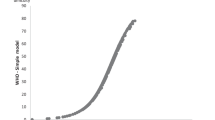Abstract
The World Health Organization Short Disability Assessment Schedule (WHO DAS-S) is an instrument for clinicians' assessment and rating of difficulties in maintaining personal care, in performing occupational tasks and in functioning in relation to the family and the broader social context due to mental disorders. The WHO DAS-S was developed and underwent preliminarily testing in the context of two international field trials of the multiaxial presentation of ICD-10 for use in adult psychiatry. The instrument was found to be useful, user-friendly and reasonably reliable for use by clinicians belonging to different schools of psychiatry and psychiatric traditions. Further work on the WHO DAS-S should include development of national adaptations of the instrument, studies of concurrent validity of the instrument and modification of the instrument to accommodate changes in the next edition of the International Classification of Impairments, Disabilities and Handicaps (ICIDH).
Similar content being viewed by others
References
World Health Organization (1992) International statistical classification of diseases and related health problems, 10th revision (ICD-10). WHO, Geneva
Janca A, Kastrup M, Katschnig H, López-Ibor JJ Jr, Mezzich JE, Sartorius N (1996). The ICD-10 multiaxial system for use in adult psychiatry: structure and applications. J Nerv Ment Dis 184: 191–192
Kastrup MC (1994) Multiaxial diagnosis and environmental factors: psychosocial stressors and supports. In: Mezzich JE, Honda Y, Kastrup MC (eds) Psychiatric diagnosis: a world perspective. Springer, New York, Berlin Heidelberg, pp 182–190
Katschnig H (1994) Disabilities in a multiaxial formulation. In: Mezzich JE, Honda Y, Kastrup MC (eds) Psychiatric diagnosis: a world perspective. Springer, New York, Berlin Heidelberg, pp 191–202
López-Ibor JJ Jr (1994) Axial organization of clinical diagnoses: In: Mezzich JE, Honda Y, Kastrup MC (eds) Psychiatric diagnosis: a world perspective. Springer, New York, Berlin Heidelberg, pp 175–181
Mezzich JE (1994) Multiaxial diagnosis: purposes and challenges. In: Mezzich JE, Honda Y, Kastrup MC (eds) Psychiatric diagnosis: a world perspective. Springer, New York Berlin Heidelberg, pp 167–174
World Health Organization (1996) The multiaxial presentation of ICD-10 for use in adult psychiatry. WHO, Geneva (in press)
World Health Organization (1980) International classification of impairments, disabilities and handicaps (ICIDH) WHO, Geneva
World Health Organization (1988) WHO psychiatric disability assessment schedule (WHO/DAS). WHO, Geneva
Jablensky A, Schwarz R, Tomov T (1980) WHO collaborative study on impairments and disabilities associated with schizophrenic disorders. A preliminary communication: objectives and methods. In: Strömgren E, et al (eds) Epidemiological research as basis for the organization of extramural psychiatry. Acta Psychiatr Scand 62:[Suppl 286]: 152–159
MacLennan RN (1993) Interrater reliability with SPSS for Windows 5.0. Am Stat 47: 292–296
Chul AW, Mezzich JE (1989) PROPOV-K: a Fortran program for computing a kappa coefficient using a proportional overlap procedure. Comput Biomed Res 22: 415–423
Cohen J (1960) A coefficient of agreement for nominal scales. Educ Psychol Meas 20: 37–46
Mezzich JE, Kraemer HC, Worthington DRL, Coffman GA (1981) Assessment of agreement among several raters formulating multiple diagnoses. J Psychiatr Res 16: 29–39
Rae G (1988) The equivalence of multiple rater kappa statistics and intraclass correlation coefficients. Educ Psychol Meas 48: 367–374
Üstün TB, Cooper JE, Van Duuren-Kristen S, Kennedy C, Hendershot G, Sartorius N (1995) Revision of the ICIDH: Mental health aspects. Disabil Rehabil 17: 202–209
Author information
Authors and Affiliations
Rights and permissions
About this article
Cite this article
Janca, A., Kastrup, M., Katschnig, H. et al. The World Health Organization Short Disability Assessment Schedule (WHO DAS-S): a tool for the assessment of difficulties in selected areas of functioning of patients with mental disorders. Soc Psychiatry Psychiatr Epidemiol 31, 349–354 (1996). https://doi.org/10.1007/BF00783424
Accepted:
Issue Date:
DOI: https://doi.org/10.1007/BF00783424




